Linwood pits
Available evidence suggests two separate pits, or groups of workings in the Linwood area:
- Linwood pit, worked by coal and shale by James Anderson & Co for their Linwood shale oil works between c.1868 and c.1874, probably located at -marked as "old shaft" close Barrowmonous Cottage on the 1895 OS map. This pit appears to have been taken over by the Clippens Oil Company, (along with other interests of the Linwood shale oil works) in c.1876 and continued in production until c.1884.
- Linwood (or Linnwood) pits, exploited principally for ironstone from pre-1857 to post-1885. Two active ironstone are marked on the OS map c.1857 are most likely to be those owned by Merry & Cunninghame, although a newspaper reference (see snippets below) makes reference to a Linwood pit of Colin Dunlop & Co. Other newspaper accounts (below) make mention of the sinking of Linwood No.2 ironstone pit "on the farm of Green" in 1873. A Caledonian Railway Act of 1883 (see below), covers the purchase of James Dunlop & Co.'s mineral railway from Blackstone junction to Linwood No.2 pit described as being SW of Linwood. A depot part way along this line is described as being close to Linwood No.1 ironstone pit.
Directory Listings
References from annual mineral statistics :
- Colliery at "Linwood", worked by James Anderson, listed in 1868, 1870, 1871 and 1874
- Colliery at "Linnwood" worked by Merry & Cunninghame, listed in 1866, 1868, 1870, and 1871
- Ironstone working at "Linnwood", worked by John Gray, listed in 1879
- Ironstone working at "Linnwood", worked by James Dunlop & Co. (manager, Jas. McGill) in 1885
Entries in "Watson's Directory for Paisley"
- Barrowman, John, underground oversman, Linwood Shale Oil Works – house, at the Works (1870-75)
- Barrowman, Thomas, manager, Linwood Shale Oil Works, - house, Graham Street, Johnstone (1870-72), mineral manager, Linwood (1873-74) Linwood Shale and Coal Works – Canderside Colliery, Stonehouse (1875)
- Linwood Shale Pit – James Scott, proprietor (1876-80)
- Linwood Shale Pit – Clippens Oil Co. (Limited) (1884-85)
Location maps
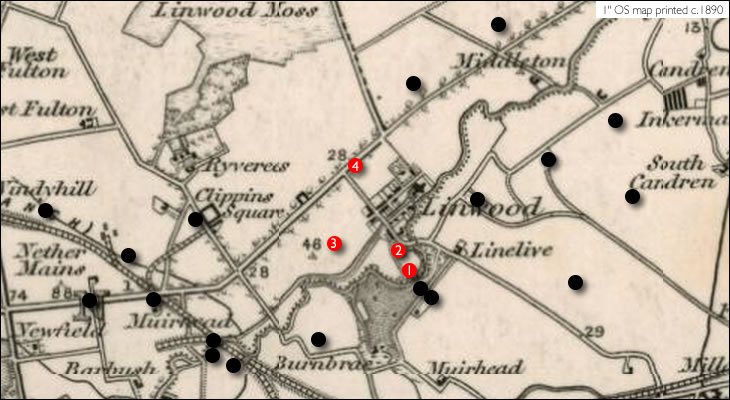
Pits plotted on 1" OS map (1890). Possible Linwood pits marked red, others black
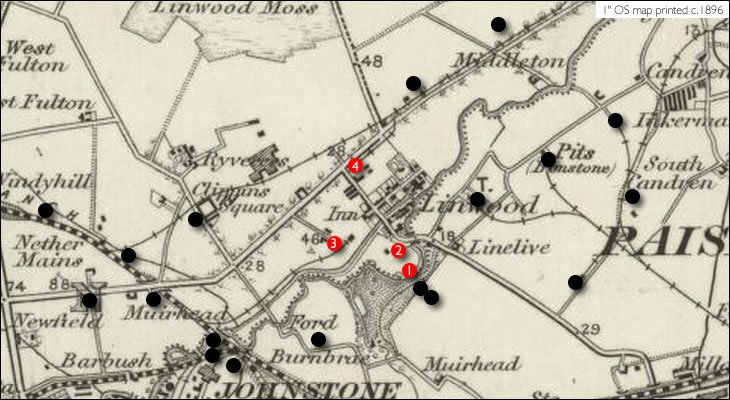
As above, plotted on 1" OS map, printed c.1898
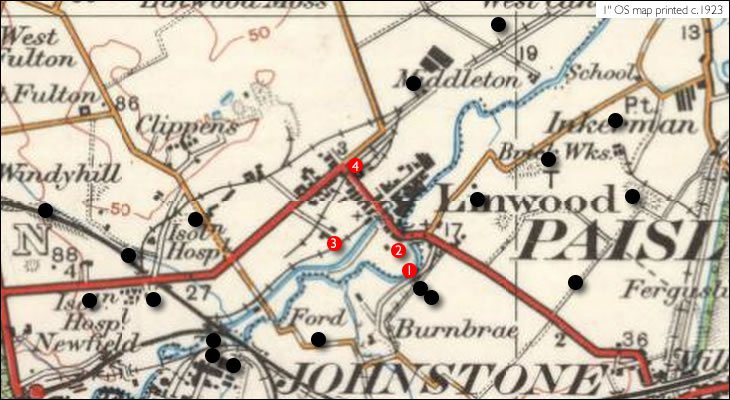
As above, plotted on 1" OS map, printed c.1923
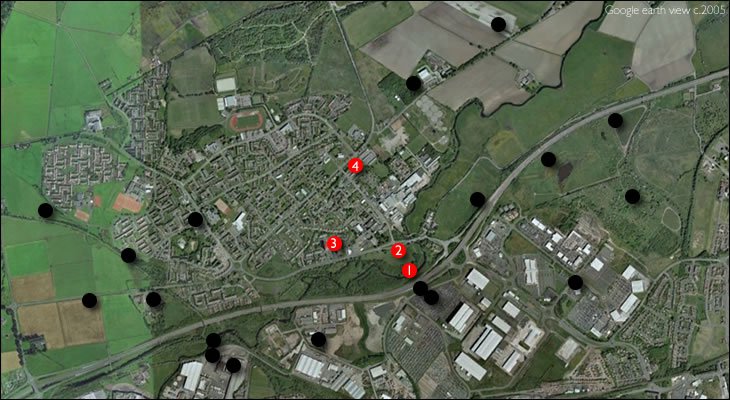
As above, plotted on Google earth image
Key to markers on the location maps.
- (55.845319, -4.486333) Active "ironstone pit" marked on the 1857 OS map, close to the River Cart
- (55.846876, -4.487321) Active "ironstone pit" marked on the 1857 OS map, close to Linwood village
- (55.846268, -4.492858) Show as "old shaft" on 1895, this is probably the site of Linwood pit of James Anderson & Son, serving the Linwood shale oil works, most likely on a site adjoining the pit. Andrew Wilson in Linwood's Lost Railways (Renfrewshire Local History Federation Journal Vol. 12 2003-4) states this to be "Barrowman's Pit" serving the Linwood shale oil works. Watson's Directory lists John Barrowman as underground oversman at the Linwood shale oil pits, living initially in a house at the works; this doubtless account for the name "Barrowmonous Cottage" shown on the 1895 OS map. However; newspaper accounts suggest James Dunlop & Co.'s Linwood No. 2 ironstone pit lay in the lands of Green farm to the south west of Linwood, and connected by railway to Linwood No.1 pit. This suggested a site very close to "Barrowman's Pit" , and perhaps a re-use or redevelopment of the earlier workings
- (55.850711, -4.491848) Probably the site of Linwood No.1 ironstone pit. Local historian Andrew Wilson (see above) states that "Dunlop's Pit" lay adjacent to the Caledonian Railway's Linwood Goods Depot. This is supported by a reference to James Dunlop & Co.'s Linwood No.1 pit in the Caledonian Railway Act of 1883 (see below).
Detail maps
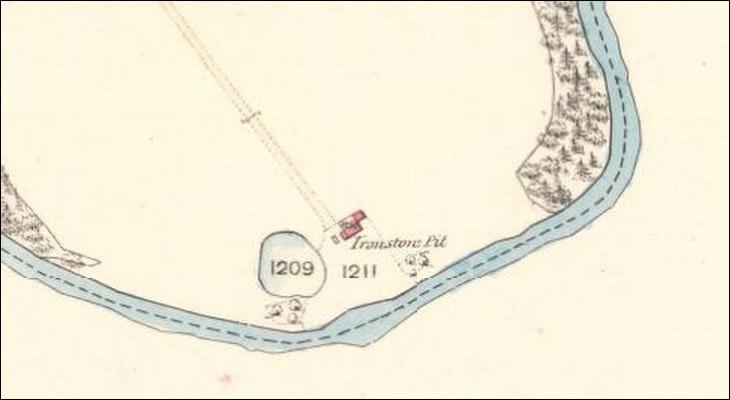
25" OS map c.1857 showing ironstone pit close to River Cart
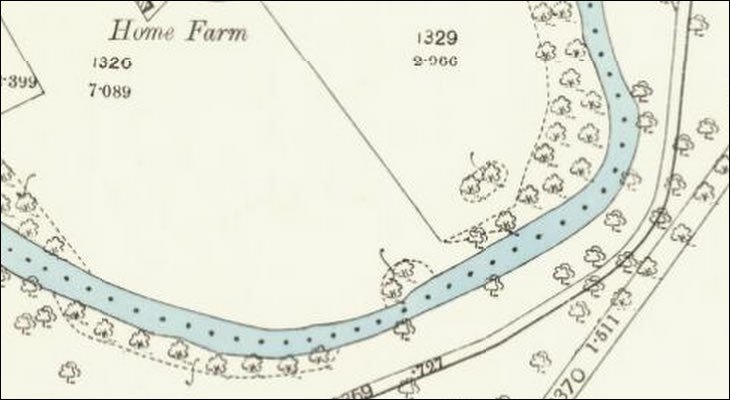
25" OS map c.1895, same area as above
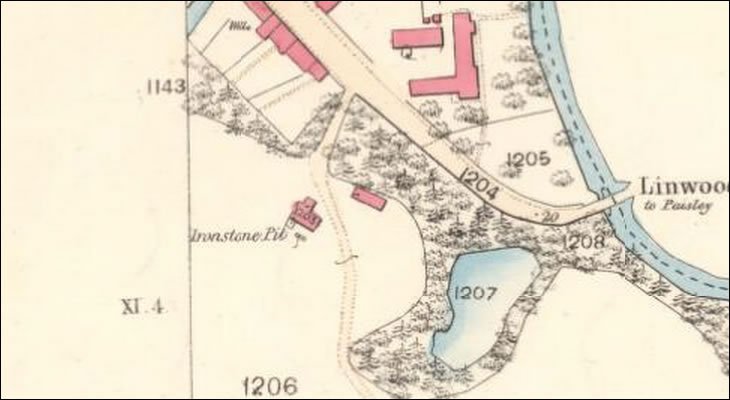
25" OS map c.1857, showing ironstone pit close to Linwood village
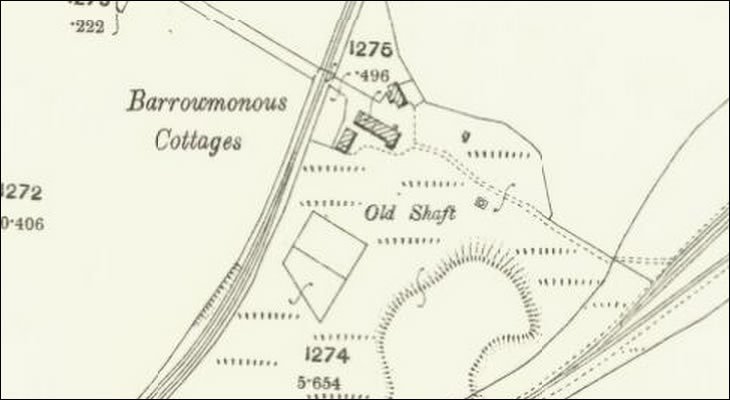
25" OS map c.1895, showing site of "Barrowman's pit"
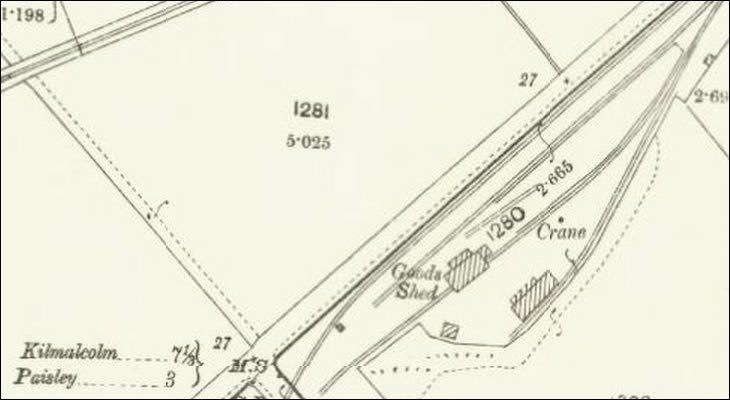
25" OS map c.1895, showing site of Linwood No.1 pit
INFIRMARY—The Treasurer of the Infirmary requests us to acknowledge with thanks, receipt of the undernoted sums handed him in aid of the institution, viz : Workers of Messrs. Colin Dunlop & Co., Blackstone and Linwood pits, per Peter Niven, Esq., manager, per Mr James Thomson, cashier, £11 18s 0d
The Paisley Herald and Renfrewshire Advertiser, 26th December 1863
.......
Thefts.—Patrick Lynch, a labourer, was sentenced to imprisonment for stealing four and a half stones of corn, a bag, and a lamp from a stable at No. 1 ironstone pit, Linwood, the door of which he had forced open.
The Paisley & Renfrewshire Advertiser, 14th December 1867
.......
PAISLEY FATAL ACCIDENT IN AN IRONSTONE PIT, - On Thursday, William Anderson, miner, residing at Linwood, met with an accident which occasioned his death, in the No. 2 Linwood Pit, which pit is situated on the farm of Green, parish of Kilbarchan. Anderson, it appears. was employed along with two others in sinking the pit, and was being drawn up along with one of his companions, when his shoulder came in contact with a mid partition, whereby he was jerked out of the machine, and fell to the bottom from a height of about eight fathoms. His collar-bone was broken, and he was so much injured internally that he died in the course of two hours afterwards. The unfortunate man was about 31 years of age.
The Glasgow Herald 17th October 1873
.......
To confirm an agreement entered Into between Robert Thomas Napier Speir of Culdees Castle and of Blackstone, and James Dunlop of Tollcross. carrying on business coal and iron master at Clyde Iron Works, and elsewhere, under the firm of James Dunlop & Company, and the Company, dated the day of April, and 19th and 24th days of May 1881, and any subsequent agreements between those parties, for the sale to the Company of the Branch Railway leading from the said James Dunlop & Company's ironstone pit, called Linwood Pit No. 2, on the south-western side of the village of Linwood, to the Company's Glasgow and Greenock Line on the Farm of Blackstoun Mains, near the post indicating a distance on that line of 9 1/4 miles from Glasgow, including the depot adjoining to the said Branch Railway, near the pit called Linwood Pit No. 1. and the lands upon which the said Branch Railway and depot are formed and adjoining thereto, all the Parish of Kilbarchan. the county of Renfrew; and to provide that the said Branch Railway, Depot, and land shall form part of the Company's undertaking as also to enable the said parties enter into further agreements with each other with respect the said Branch Railway. Depot, and Lands.
From the Caledonian Railway (Further Powers) Act 1882, printed in the Dundee Advertiser, 28th December 1881